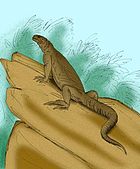Isodontosaurus: Difference between revisions
Appearance
Content deleted Content added
No edit summary |
GreenC bot (talk | contribs) Move 1 url. Wayback Medic 2.5 per WP:URLREQ#fossilworks.org |
||
| (18 intermediate revisions by 13 users not shown) | |||
| Line 1: | Line 1: | ||
{{Short description|Extinct genus of lizards}} |
|||
{{Automatic taxobox |
{{Automatic taxobox |
||
| taxon = Isodontosaurus |
|||
| fossil_range = [[Late Cretaceous]] |
|||
| fossil_range = [[Late Cretaceous]], {{Fossil range|84.9|70.6|ref=<ref name=fossilworks/>}} |
|||
| image = |
| image = |
||
| image_caption = |
| image_caption = |
||
| Line 8: | Line 10: | ||
}} |
}} |
||
'''''Isodontosaurus''''' is an extinct [[genus]] of [[iguania]]n lizard from the [[Late Cretaceous]] of Mongolia. The [[type species]] is '''''Isodontosaurus gracilis'''''. ''Isodontosaurus'' is part of an extinct group of Late Cretaceous iguanians called [[Gobiguania]], which is currently thought to be endemic to Mongolia.<ref name=Detal12>{{ |
'''''Isodontosaurus''''' is an extinct [[genus]] of [[iguania]]n lizard from the [[Late Cretaceous]] of Mongolia and China.<ref name=fossilworks/> The [[type species]] is '''''Isodontosaurus gracilis'''''. ''Isodontosaurus'' is part of an extinct group of Late Cretaceous iguanians called [[Gobiguania]], which is currently thought to be endemic to Mongolia.<ref name=Detal12>{{Cite journal | last1 = Daza | first1 = J. D. | last2 = Abdala | first2 = V. | last3 = Arias | first3 = J. S. | last4 = García-López | first4 = D. | last5 = Ortiz | first5 = P. | title = Cladistic analysis of Iguania and a fossil lizard from the Late Pliocene of northwestern Argentina | doi = 10.1670/10-112 | journal = Journal of Herpetology | volume = 46 | pages = 104–119 | year = 2012 | s2cid = 85405843 | hdl = 11336/61054 | hdl-access = free }}</ref> |
||
==References== |
==References== |
||
{{Reflist|refs= |
|||
{{reflist}} |
|||
<ref name=fossilworks>{{cite web |url=https://paleobiodb.org/classic/checkTaxonInfo?taxon_no=38064 |title=†''Isodontosaurus'' Gilmore 1943 |work=Paleobiology Database |publisher=Fossilworks |access-date=30 January 2020 |archive-date=13 December 2021 |archive-url=https://web.archive.org/web/20211213014832/http://www.fossilworks.org/cgi-bin/bridge.pl?a=taxonInfo&taxon_no=38064 |url-status=live }}</ref> |
|||
}} |
|||
==External links== |
==External links== |
||
* [http://paleobackup.nceas.ucsb.edu:8090/cgi-bin/bridge.pl?action=checkTaxonInfo&taxon_no=38064&is_real_user=0 Isodontosaurus on paleobackup.nceas.ucsb.edu] |
|||
* [http://www.paleofile.com/Demo/Mainpage/Taxalist/Lizard.htm Isodontosaurus on paleofile.com] |
* [http://www.paleofile.com/Demo/Mainpage/Taxalist/Lizard.htm Isodontosaurus on paleofile.com] |
||
| ⚫ | |||
| ⚫ | |||
{{Extinct squamates|I.}} |
{{Extinct squamates|I.}} |
||
{{Taxonbar|from=Q6085628}} |
|||
| ⚫ | |||
| ⚫ | |||
[[Category:Late Cretaceous lepidosaurs of Asia]] |
|||
[[Category:Fossil taxa described in 1943]] |
|||
[[Category:Taxa named by Charles W. Gilmore]] |
|||
{{paleo-lizard-stub}} |
{{paleo-lizard-stub}} |
||
Latest revision as of 07:35, 18 November 2024
| Isodontosaurus Temporal range: Late Cretaceous,
| |
|---|---|
| Scientific classification | |
| Domain: | Eukaryota |
| Kingdom: | Animalia |
| Phylum: | Chordata |
| Class: | Reptilia |
| Order: | Squamata |
| Suborder: | Iguania |
| Clade: | †Gobiguania |
| Genus: | †Isodontosaurus Gilmore, 1943 |
| Type species | |
| †Isodontosaurus gracilis Gilmore, 1943
| |
Isodontosaurus is an extinct genus of iguanian lizard from the Late Cretaceous of Mongolia and China.[1] The type species is Isodontosaurus gracilis. Isodontosaurus is part of an extinct group of Late Cretaceous iguanians called Gobiguania, which is currently thought to be endemic to Mongolia.[2]
References
[edit]- ^ a b "†Isodontosaurus Gilmore 1943". Paleobiology Database. Fossilworks. Archived from the original on 13 December 2021. Retrieved 30 January 2020.
- ^ Daza, J. D.; Abdala, V.; Arias, J. S.; García-López, D.; Ortiz, P. (2012). "Cladistic analysis of Iguania and a fossil lizard from the Late Pliocene of northwestern Argentina". Journal of Herpetology. 46: 104–119. doi:10.1670/10-112. hdl:11336/61054. S2CID 85405843.
External links
[edit]





